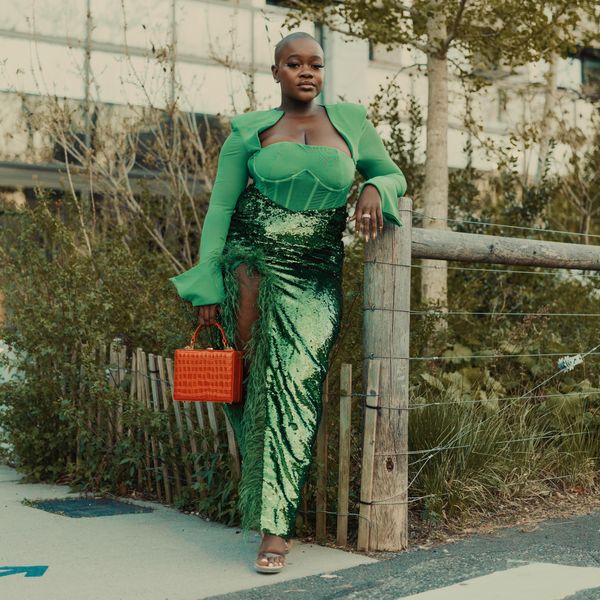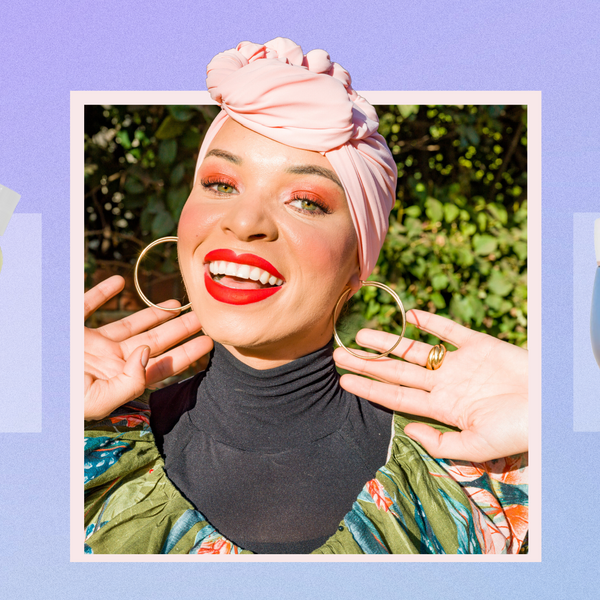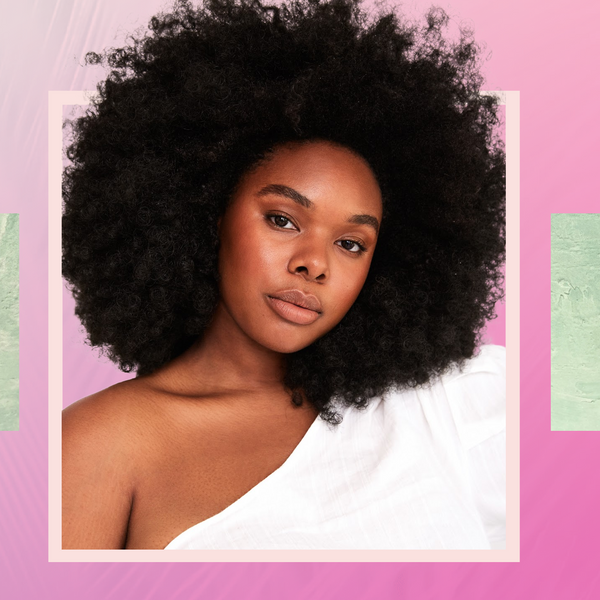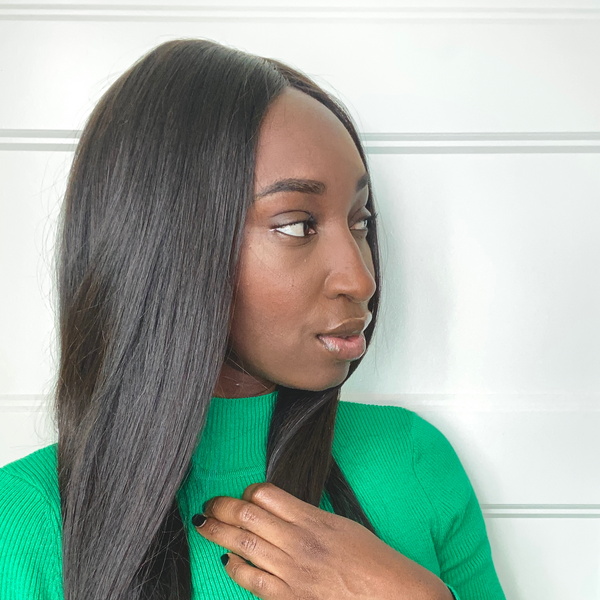
This Influencer Shares Her Investment Skincare Routine
In About Face, xoNecole gets the 411 on IGers who give us #skincaregoals on the daily. Here they break down their beauty routines on the inside and out, as well as the highly coveted products that grace their shelves and their skin.
Natacha John, or Tacha, is a 24-year-old beauty and lifestyle content creator. The DMV native came on my radar after a viral photo of her made its way to my Explore page on Instagram. The rest is history.
Last month, she revealed to her followers that she was officially taking the leap into full-time entrepreneurship, having grown an impressive following of 40,000 followers and counting. As a creative who earns her living by literally doing her. "I get to be myself for a living," she tells xoNecole. "I get to share my interests, exercise my creativity, and connect with women. Those are definitely my favorites parts!"
In the process, she is also putting us on to her favorite beauty finds and it's nothing short of amazing. Although I live for her aesthetic and her thought-provoking questions, I am also an admirer of her glowing, radiant skin. That being said, I had to know what her beauty arsenal consisted of.
Below, Tacha shares with us the products she swears by and how she achieves beauty from the outside in.
My morning routine looks like...
"I'm still trying to establish a consistent morning routine but usually it starts off with taking care of my puppy and straightening up my apartment while I make a cup of tea. Then I'm usually checking emails and reviewing my to-do list for the day. Some mornings, I'll toss in journaling and meditation. Those two things always make me feel level-headed but I'll admit I'm bad at making consistent time for them."
For my skincare routine in the AM...
"I keep it ultra simple in the morning. I don't cleanse, I just rinse my face with water and sometimes, depending on my skins condition, I'll tone either using Goode Skin's two hundred dollar water micellar cleanser or Thayers Witch Hazel. Then I moisturize with a facial oil, like Aura Cacia Jojoba Oil, and top it off with my favorite SPF, La Roche-Posay's Anthelios Clear Skin Sunscreen."
And for my skincare routine in the PM...
"Things are more extensive in the evenings. I always start off by double cleansing. Face wash is the one thing in my routine that I'm constantly switching out but I'm currently enjoying the Farmacy's Clean Bee cleanser and Neutrogena's Hydro Boost cleanser. Once or twice a week, I'll add in exfoliation using Lush's Dark Angels [or their] Herbalism [herbal wash], or Goode Skin's SKINZYME. And follow up with First Aid Beauty's Ultra Repair Liquid Recovery. That's become one of my favorite steps! The liquid recovery goes onto your skin like water and is so soothing and calming, I can't get enough. Then, I moisturize with an oil again. About 2 or 3 times a week I'll apply a face mask, I like Farmacy's Bright On mask."
How I approach skincare on-the-go...
"When I'm on-the-go, I have to have products that I know work for me so if my skin starts to act crazy, I'm ready! You'll usually catch me with a mask that's good for breakouts, either my Glamglow Supermud Clearing Treatment Mask or Yes to Tomatoes Detoxifying Charcoal Mud Mask. And something that's good for dry/dull skin like my Origins' Drink Up Intensive Overnight Hydrating Mask."
My go-to makeup look consists of...
"I'm a natural makeup kind of girl. On a day-to-day basis, I'll be bare-faced or maybe have on some concealer or tinted moisturizer, blush, and mascara. Lately, I've been reaching for my Laura Mercier tinted moisturizer (in Almond), Glossier Cloud Paint, and my trusty L'Oreal Telescopic mascara. I like to keep things pretty low-maintenance but if I have to be in front of the camera or have an event to attend, I'll go all in."
How I approach beauty from the inside-out...
"Something as small as starting my day with a cup of hot lemon water and half an hour of uninterrupted alone time helps me to feel refreshed and ready to put forth my best self throughout the day. I get pulled in a lot of different directions and it's easy to feel overwhelmed when you're a one woman team, so taking that time to level myself out really helps me to feel more at peace."
What self-care looks like to me...
"To be completely transparent, I don't make a ton of time to unwind. It's something I'm really working on though! Usually I'm working well into the evening, and when I finally unplug, all I have time for is a hot shower before I crawl into bed. But I value that time and make the most with what I have. While I'm getting ready for bed, I usually play a good podcast or Audiobook and add a few drops of essential oil to my shower to make things extra relaxing."
For more of Tacha, follow her on Instagram.
Shop Tach's Beauty Staples:
*Some links are affiliate links. If you make a purchase, xoNecole may earn a small commission.
Featured image via Tacha/Instagram
ItGirl 100 Honors Black Women Who Create Culture & Put On For Their Cities
As they say, create the change you want to see in this world, besties. That’s why xoNecole linked up with Hyundai for the inaugural ItGirl 100 List, a celebration of 100 Genzennial women who aren’t afraid to pull up their own seats to the table. Across regions and industries, these women embody the essence of discovering self-value through purpose, honey! They're fierce, they’re ultra-creative, and we know they make their cities proud.
VIEW THE FULL ITGIRL 100 LIST HERE.
Don’t forget to also check out the ItGirl Directory, featuring 50 Black-woman-owned marketing and branding agencies, photographers and videographers, publicists, and more.
THE ITGIRL MEMO

I. An ItGirl puts on for her city and masters her self-worth through purpose.
II. An ItGirl celebrates all the things that make her unique.
III. An ItGirl empowers others to become the best versions of themselves.
IV. An ItGirl leads by example, inspiring others through her actions and integrity.
V. An ItGirl paves the way for authenticity and diversity in all aspects of life.
VI. An ItGirl uses the power of her voice to advocate for positive change in the world.
Let’s make things inbox official! Sign up for the xoNecole newsletter for daily love, wellness, career, and exclusive content delivered straight to your inbox.
8 Eyebrow Trends And What You Should Know Before Trying Them
I like knowing random information; I think that’s a part of what’s kept me in the writing game, full-time, since 2000. Anyway, a few years back, I remember reading that some of the first things that men notice on women are their faces, their bodies, if they’re loud, if they’re with guys or girls, and their accessories. That got me thinking that, even though I’m heterosexual, I can appreciate a woman, lawd. And so, what I tend to notice first is her body, her hair, and, if I’m close enough, her lips and eyebrows.
Yep. Eyebrows. I dunno. Like they say that you can learn a lot about a man by the kind of shoes he has on (and how well he takes care of them), I feel that way about a woman’s eyebrows: I think that you tend to be pretty intentional about your appearance if your eyebrows are on-point — and personally, I appreciate that.
Since I also once read that around one-quarter of women use eyebrow pencils to make their brows look as perfect as possible, I took that as a sign that I can’t be the only one who is as into eyebrows as I am. That’s why I thought it would be cool to take a moment to share some of the current eyebrow trends that are poppin’ out in these streets…in case you’re looking to switch up your own brow look any time soon.
8 Eyebrow Trends You'll See Everywhere in 2024

Getty Images
1. High Arches
A few years back, I would get my eyebrows threaded. There was a place that was much closer to me than where I go to get waxed now, and it was convenient. So, why did I stop? The main reason was that the ladies kept creating higher and higher arches which meant my brows were getting thinner and thinner — and that was really pissing me off.
I did some asking around to see if this was other people’s experiences, and (le sigh) apparently it is (the losing brows in threading, I mean. If it has been for you, would you hop in the comments and let me know?). Anyway, although I much rather have my brows follow another trend on the list (more in a bit), I will say that high arches are something that’s currently really popular.
To a certain extent, I get it. They can be sexy, especially if you like to play around with eyeshadow. My main problem is I HATE the growing out processing of thinner brows — so, if you’re contemplating “upping your arch,” just keep in mind that it could take 3-4 months to grow them back out again. Geeze.
@kyranikole2 this was not on the agenda for today but just wanted a little umph for these brows lol
2. Tinting
And what if you’re currently in the growing out stage and you’re trying to figure out how to make it through? Back when I was in the process of wanting my own eyebrows to look fuller, this is right where I was. The remedy was another current trend: eyebrow tinting. Long story short, it’s a semi-permanent coloring approach that can help to fill in sparse areas of your eyebrows and/or make them darker in order to give them more definition.
If there is a heads up that I would give for this, it’s that, if you end up not liking the tint job once it’s done, it could take a few weeks for the tinting to fade completely. Oh, something else: be sure about the color you want. Sometimes, that black can be way too much on lighter skin tones. So, make sure that you are crystal clear with the esthetician about what your expectations are. One more thing: discuss the chemicals that are in the products. Some folks have been known to have an allergic reaction from time to time.
3. Serums
Okay, so what if you want the depth that tinting provides, yet you’d prefer to avoid the permanence that the method offers? A great alternative is yet another eyebrow trend for this year: eyebrow serums. The cool thing about those is they can help to smooth out your brows while giving them dimension in a no-side-effects kind of way. That’s because a lot of serums contain ingredients that help to condition your brow hairs so that they are able to remain healthy and strong. Plus, they actually contribute to the growing out process. Glamour has a list of eyebrow growth serums here; Vogue has some others here.
@itslexclusive Replying to @MulaMone This is a halo brow free zone!💅🏾 @REVOLUTION brow soap styler @Milani brow pen -espresso @NARS Cosmetics concealer pot - Amande &Cacao #eyebrowtutorial #eyebrowtutorialblackgirl #blackgirlmakeup #fluffybrows
4. Fluffy Brows
As for me and my house, I’m not sure what I think about fluffy brows because, every time that I look at them, I feel like the hairs that are poking out at the top of the brow line need to be trimmed — yet hey, to each their own, right? The flip side to these is they do look hella full and healthy, so that’s a plus. Anyway, although some people like to achieve this look with brow lamination because there are some long-term risks that potentially come with going that route (you can read more about that here), just know that if you want to try the fluffy style out, you can also make it happen with the help of some hairspray or eyebrow wax.
5. Two-Tones
Something else that I peeped that some folks are into right now is two-toned or ombré-looking eyebrows (this typically means lighter-looking brows towards your eyes and darker towards your temples). Now, this look can be achieved in a few different ways. Some folks get their eyebrows tattooed (you can see it here). Some apply henna (you can see that here). Others use make-up, especially in order to create drastic, colorful eyebrows (there’s an example of those here). Whatever route you decide to take, if you want eyebrows that look less one-dimensional, two-tone/ombré will make it happen (the make-up approach is really great for photoshoots, by the way).
@jeriekaewing How to achieve the straight eyebrow shape. I wanted something different and decided to change the shape of my eyebrows. Concealer used is by @toofaced brow pomade is by @suggacosmetics (they no longer sell it) #fyp #xyzbca #makeuptutorial #makeuphacks #blackgirlmakeup #browtutorial #browtransformation #straighteyebrows
6. Straight Brows
Something that has been all over the place, both this year and last, is straight eyebrows. This look is pretty much what it sounds like: people are trying to remove as much curve from their brows as possible, which means that many are taking off the tail end of their own eyebrows so that there is less of an arch while others are removing the end and then using eyeliner to create a straight eyebrow tip.
Some folks believe that taking this particular approach to their brows helps to make them look younger. Personally, I don’t see it but…just putting it out there if you’re bored with your own eyebrows and you want to try something different. Or trendy.
7. Natural Brows
You know how you need to go to a hairstylist who wants to give you what YOU want and not what THEY think is best? Same goes with an esthetician — and I adore mine. For years, I was doing my eyebrows myself. I started seeing her when I wanted to do some pampering (in fact, had I not been getting my eyebrows done the day that my house blew up, I probably wouldn’t be writing this article now). Years later, while I can still get the job done in the pinch, I still see her about once a month because she’s trained to create the brow look that I’m after in such a precise way that I don’t need to apply anything until the next appointment (and I adore that for me!).
No doubt about it, she has my brows looking really full, very natural, and with a gradual arch. As life would have it, natural brows are in, too. I don’t really care, though. I don’t see myself switching up from natural brows any time soon — trend or not. *Elmo shrug*
8. (Baby) Brow Lifts
There used to be a time when it was mostly older women who went through the cosmetic procedure of a formal brow lift. It was because they wanted to remove any wrinkly or aging skin around their eyes while also “lifting” their forehead a bit so that they could look younger. These days, younger ladies are following suit, especially by getting what is known as a “baby brow lift.” What medical professionals are saying is a lot of women sing the baby lift’s praises because it gives them a higher arch and a more exotic look with less downtime (for instance, botox can provide this effect, although you will have to get it redone as the botox wears off while others are combining brow lamination with brow tinting).
Since this option is probably the most expensive out of all of the trends here, definitely make sure you want to shell out this much cash and that you consult with a reputable cosmetic surgeon about if you need it as much as you think that you do.
____
It’s kind of funny that the two strips of hair that are there to keep sweat ‘n stuff out of our eyes (and help us to communicate effectively) get so much cosmetic attention. Hey, I appreciate it, though. I say it often: a woman with some manicured brows, a couple of coats of mascara, and something on her lips usually doesn’t NEED anything more than that.
Whether she follows trends or…not. #Elmoshrugagain
Let’s make things inbox official! Sign up for the xoNecole newsletter for daily love, wellness, career, and exclusive content delivered straight to your inbox.
Featured image by Ayo Banko/Getty Images


















